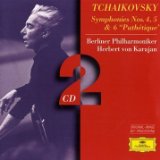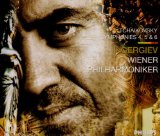Tchaikovsky's Symphony 4
Emotional Music, Dramatic Anguish
The Tchaikovsky Symphony 4 is a dramatic statement of the composer's inner turmoil. Tchaikovsky broke free of the traditional musical structures of his time, so that he could express his turbulent personal emotions...
Because of the piece's majestic drama and turmoil, and because it broke with established tradition, audiences and critics didn't like it at first. One reviewer even called it "semi-barbaric"!
But it soon established Tchaikovsky as a important writer of symphonies. Nowadays it's one of the more frequently performed symphonies. Personally, I really enjoy the first and second movements. Some of Tchaikovsky's most intense music!
Tchaikovsky wrote his 4th Symphony during 1877 and 1878, and finished it while he was in traveling in Italy. He was still getting over his depression from a disastrous marriage to one of his former pupils during this time. The violent emotions in the symphony are actually a reflection of how he was feeling at the time.

Tchaikovsky Symphony 4 - Movements
Tchaikovsky tried to explain the general idea of the symphony to his patroness (Nadehzda von Meck). But he told her he could only illustrate it in broad terms, since he thought that music was a more powerful and subtle way of expressing feelings than words (I agree!).So any description is bound to miss out on all the different nuances of expression. Nevertheless, here's what Von Meck learned about the Tchaikovsky Symphony 4 from the composer's own pen...
The first movement, by far the longest (people thought it was too long when it premiered!), opens with the main idea for the whole symphony. This dramatic brass motif represents the invincibility of Fate:
Tchaikovsky explains that since Fate prevents happiness, it's hopeless to yearn for it. Much better to ignore reality and give in to fantasies and daydreams...
...losing yourself, until a glimpse of happiness appears:
But eventually Fate returns and wakes you from your imagination:
So the first movement is pretty much summed up by this depressing thought from Tchaikovsky:
"And so all life is an unbroken alternation of harsh reality with swiftly passing dreams and visions of happiness..."
The second movement of the Tchaikovsky Symphony 4 is a different kind of sadness, according to the composer. He explains that it's a sort of tiredness mixed with nostalgia. Tchaikovsky expresses this with slow sweeping strings. I'd say this is my favorite movement.
Tchaikovsky confessed that the third movement (a joyful scherzo) didn't really express any particular emotions. Instead it represents fleeting images, such as happy peasants dancing, which cross your mind as you fall asleep. This is a fun little movement, which uses an orchestral effect which Tchaikovsky said he created.
The fourth movement is a grand, crashing orchestral thrill ride. Tchaikovsky uses a popular Russian folk melody to depict a festival. But not so fast! The familiar "fate" theme returns, ruining the fun, and reminding you that you're still sad (what a downer!).
The whole 4th Symphony is dedicated to "My Best Friend", which means Tchaikovsky's dear friend and patroness Nadehzda von Meck. Interestingly, in Russia at the time, when an artist dedicated a work to patron it wasn't just a little "thank you". It meant that the two were equals - it's like saying that von Meck was a partner in writing the Symphony! I suppose she was in a way.
Later in his life Tchaikovsky liked his 4th Symphony more and more (he usually didn't like his own compositions later on!). He actually called it his "best symphonic work".
You might also like Tchaikovsky's powerful Romeo and Juliet Overture
Recordings of the Tchaikovsky Symphony 4
One good recording is by Herbert Karajan conducting the Berliner Philharmonic, from the 70s. The sound quality is a bit harsh and upfront, but I think this really suits some aspects of the Tchaikovsky Symphony 4, especially the incredibly lively last movement.Unfortunately I find the other movements from this recording a bit wooden! Oh well.
I'd have to say that my favorite interpretation of the Tchaikovsky Symphony 4 is by Valery Gergiev conducting the Vienna Philharmonic. It manages to capture all the different rhythms and feelings perfectly in my opinion.
Here's a video of them performing the last movement (look how excited Gergiev gets!):
You also might want to consider the 1984 recording with Mariss Jansons conducting the Oslo Philharmonic Orchestra. This is a strong performance, with a very rich orchestral timbre. The standout has to be the exciting finale, which Jansons injects with flaming passion. Overall the recording is extremely well-balanced and insightfully interpreted. Thumbs up from me!
You might want to explore some other Tchaikovsky symphonic masterworks, such as his 6th symphony or the passionate Romeo and Juliet Overture.
If you like my site, please click "Like"... thanks!




